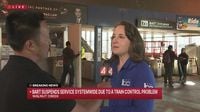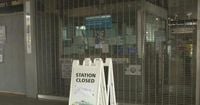On May 9, 2025, the Bay Area Rapid Transit (BART) system faced a significant disruption due to a computer networking problem that led to a complete shutdown of services, stranding thousands of commuters across the San Francisco Bay Area. The issue was first reported around 4:30 a.m., and by 5 a.m., BART officials announced that service was suspended system-wide until further notice.
As the morning progressed, commuters arriving at various BART stations, including Richmond and Rockridge, were met with closed gates and signs advising them to seek alternate transportation. Many were caught off guard by the sudden disruption, as BART is a crucial link connecting five of the region’s most populous counties, including San Francisco and Oakland, and typically serves over 150,000 riders during weekday mornings.
BART spokesperson Alicia Trost explained the situation, stating, "The computer system was not powering up as it should. So then what they start to do is reset servers to try and isolate exactly where is the problem." She emphasized that the Control Center needed to monitor all systems for safety, and without that visibility, trains could not operate.
By 9 a.m., BART announced that limited service had been restored in parts of the East Bay, with Yellow Line trains running between Antioch and MacArthur, Blue Line trains from Dublin to MacArthur, and Orange Line trains operating normally from Richmond to Berryessa station in North San Jose. However, transbay service, along with operations in San Francisco and on the Peninsula, remained suspended.
The disruption caused chaos for commuters, many of whom were forced to find alternative means of transportation. Traffic across the Bay Bridge surged, with reports of significant congestion at the toll plaza, which is typically lighter on Fridays. Rideshare services like Uber also saw increased demand, leading to higher fares.
In response to the outage, other transit agencies stepped in to assist. The San Francisco Bay Ferry deployed larger ferries to accommodate the influx of passengers needing transport from Oakland, Alameda, Richmond, and Vallejo. AC Transit, the bus service for the East Bay, warned riders to expect increased crowding and delays due to mutual aid service during the BART outage.
As commuters scrambled to adjust their plans, some expressed frustration at the disruption. Patrick Dunn, who drove to the Daly City BART station from Pacifica, found the parking lot unusually empty and was dismayed to discover that his usual commute had been thwarted. "I was thinking it’s Friday — everyone must have the day off. But then I saw that everything was barricaded," he said.
Others, like Lobsing Rinchen, a college student in Berkeley, were taken aback when they arrived at the station shortly before 8 a.m. to find it closed. "I’ll take the bus now," he commented, quickly shifting gears to find alternate transportation.
David Meland, another commuter, waited for over an hour outside the Rockridge station, worried about being late for his job at a coffee shop in San Francisco. He lamented the inconsistency of BART service, stating, "This is pretty bad." The price of a Lyft ride to his workplace was around $70, making it an impractical option.
BART Chief Communications Officer Alicia Trost noted that the agency had experienced similar computer network problems in the past, including a significant outage in 2019. She explained that it typically takes hours for the transit agency to restart its train control system after such incidents. "It’s never a good day, but ridership is significantly less on Friday," she added, acknowledging the impact of the outage on commuters.
As of the latest updates, BART officials had no clear timeline for when full service would resume. Commuters were advised to continue seeking alternate means of transportation, with BART staff deployed at stations to direct riders to buses and other public transit options. The agency also provided a link on its website for commuters to plan alternative routes.
The incident highlights the challenges faced by transit systems in maintaining reliable service, particularly in a region where public transportation is essential for daily commutes. With many commuters relying on BART to navigate the busy Bay Area, the impact of such outages can be far-reaching.
As the day unfolded, BART and other transit agencies worked to manage the situation and restore normalcy for the thousands affected by the service disruption. While limited service resumed in parts of the East Bay, the uncertainty surrounding full service restoration left many commuters anxious about their daily travel.
In the wake of this incident, BART's commitment to addressing the underlying issues and ensuring reliable service will be critical in regaining the trust of its riders. Commuters are hopeful that the agency will implement measures to prevent future disruptions and improve the overall reliability of the transit system.






